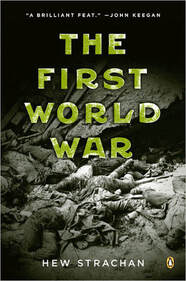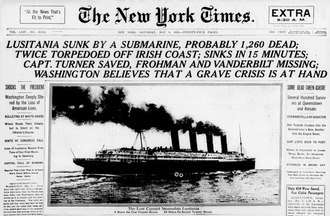...[O]n 4 February 1915 the Kaiser announced that the North Sea was a war zone and that all merchantmen, including neutral vessels, were liable to be sunk without warning. The US government immediately protested in the strongest terms, and in so doing opened a fault line between Germany's politicians, anxious to avoid incurring American wrath, and its sailors, determined to prosecute the U-boat campaign as vigorously as possible. Orders regarding the treatment of neutral vessels became ambiguous and the accusations directed by one belligerent against the other increasingly hearted - and on the whole justified. The British flew neutral flags, and they armed merchant ships. If the U-boat captain obeyed international law he was liable to have his submarine attacked, particularly if he had fallen for one of the British decoys, the heavily armed but equally heavily disguised Q ships. In July 1916 the Germans court-martialled Charles Fryatt, master of the Brussels, a British merchant vessel, on the grounds that on 28 March 1915 he had attempted to ram a U-boat although not himself a member of a combatant service. Fryatt was executed. |
| This type of rule-breaking drew the United States closer to war. Woodrow Wilson had successfully kept the U.S. out of World War I for his entire first term, and in fact ran on that fact for his second. Then a U-boat (Underwater-boat, that is - a German submarine) sank the Lusitania (though she also carried munitions), a British passenger ship. Says Hew Strachan in his book, The First World War, "[A]mong the 1,201 who died were many women and children, including 128 American citizens." It was one of the last straws in convincing U.S. politicians and citizens that it was the right time to end neutrality in WWI. Another instance occurred in June, the following year. In an event that many call the first act of terrorism on United State's soil, the explosion at Black Tom Island (New Jersey) rocked the nation. In the early house of 30 June 1916 dynamite and munitions, loaded in rail cars and barges on Black Tom, a promontory in New Jersey, caught fire. The explosions shook the Brooklyn Bridge and blew out windows in Manhattan. Believed at the time to be an accident., this was in fact the work of German saboteurs. | |
While these attacks on the Lusitania and in New York Harbor hastened the slow fuse on the U.S.'s entry into WWI, we compare that to the Japanese attack on Pearl Harbor that motivated our entry into WW2 and the 9/11 terror attacks that compelled us to fight wars in Afghanistan and Iraq. Unfair treatment of human beings, and not the acquisition of land and power, have inspired us to use military force all over the world for many years.









































